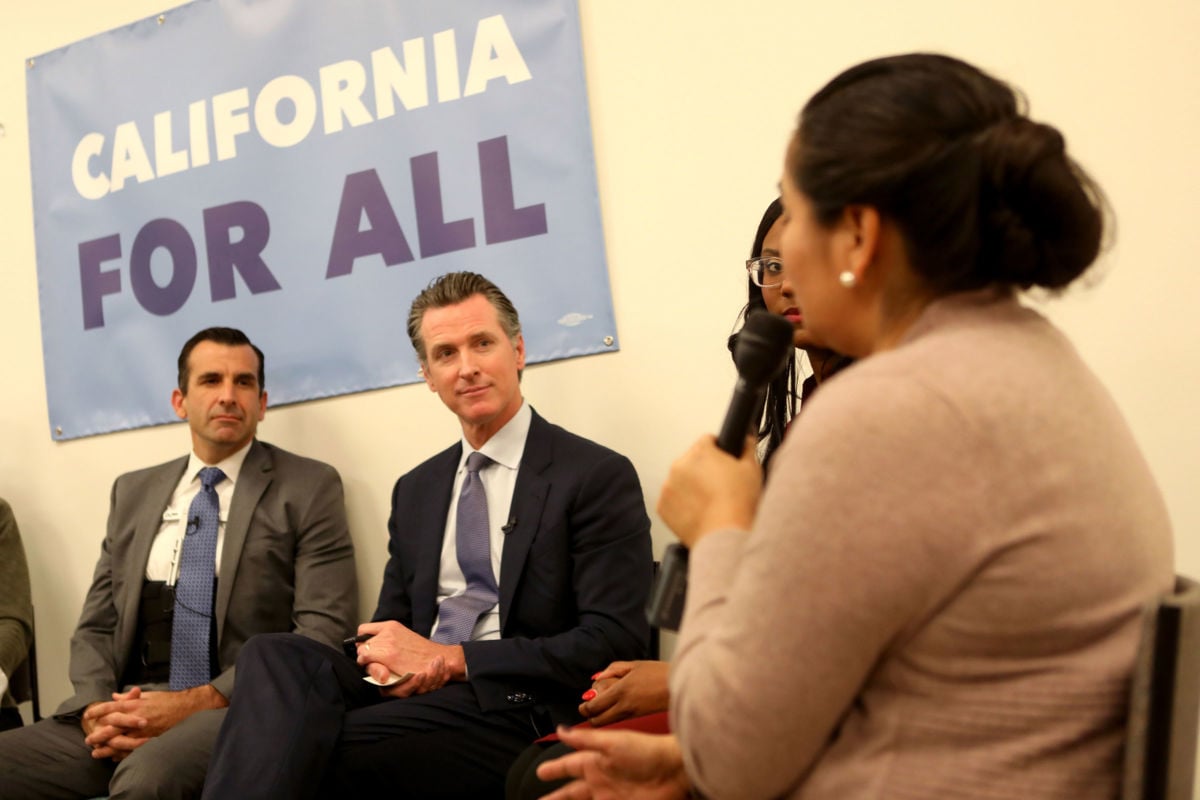Honest, paywall-free news is rare. Please support our boldly independent journalism with a donation of any size.
California Gov. Gavin Newsom on Wednesday signed into law historic legislation that would allow the state’s cities and counties to establish public banks as an alternative to private financial institutions, a move advocates hailed as a “stunning rebuke to the predatory Wall Street megabanks that crashed the global economy in 2007-08.”
Trinity Tran, co-founder of Public Bank LA, said Newsom’s decision to sign the Public Banking Act (A.B. 857) despite fervent opposition from the state’s business lobby “is a testament to the power of grassroots organizing.”
“The people of California just went up against the most powerful corporate lobby in the country — and won,” Tran said in a statement. “Now is our moment in history to lead the nation by re-envisioning finance and recapturing our money to benefit our local communities by building a new system that works for the greater good.”
The Public Banking Act — which was backed by a diverse coalition of labor unions, climate justice groups, and civil rights organizations — makes California the second state in the U.S. after North Dakota to allow the creation of public banks.
BREAKING: PUBLIC BANKS SIGNED INTO LAW!! On behalf of Californians & advocates nationwide, thank you @GavinNewsom for your leadership on #AB857! CA has enabled its cities to determine how tax revenues are invested to empower our communities. Leading the nation is what we do. pic.twitter.com/ZvFN065tIn
— California Public Banking Alliance (@calpba) October 2, 2019
As the Los Angeles Times reported:
Public banks are intended to use public funds to let local jurisdictions provide capital at interest rates below those charged by commercial banks. The loans could be used for businesses, affordable housing, infrastructure, and municipal projects, among other things.
Proponents say public banks can pursue those projects and support local communities’ needs while being free of the pressure to obtain higher profits and shareholder returns faced by commercial banks. Support for public banks also has grown since the financial crisis a decade ago and since Wells Fargo & Co. was embroiled in a slew of customer-abuse scandals in recent years.
The new law sets into motion a pilot program allowing 10 public bank charters in the state over seven years. “These banks can invest in local projects like affordable housing, small businesses, resilient infrastructure, and clean energy, giving communities a voice in their own economic futures,” said the California Public Banking Alliance.
Sushil Jacob, senior economic justice attorney with the Lawyers’ Committee for Civil Rights of the San Francisco Bay Area, said the law represents the “first step toward repairing communities that were immensely harmed by the 2008 recession, especially communities of color.”
“Today, California’s communities of color remain disproportionately harmed by Wall Street’s predatory practices,” said Jacob. “Public banks can make all of our communities whole with equitable lending and non-extractive investing.”
In a column for Common Dreams earlier this year, Ellen Brown, founder of the Public Banking Institute, applauded states like California and Washington for pursuing legislation to create state-level public banking systems and said their passage could prove a game-changer for the nation’s economy.
“The implications are huge,” Brown wrote at the time. “A century after the very successful Bank of North Dakota proved the model, the time has finally come to apply it across the country.”
A terrifying moment. We appeal for your support.
In the last weeks, we have witnessed an authoritarian assault on communities in Minnesota and across the nation.
The need for truthful, grassroots reporting is urgent at this cataclysmic historical moment. Yet, Trump-aligned billionaires and other allies have taken over many legacy media outlets — the culmination of a decades-long campaign to place control of the narrative into the hands of the political right.
We refuse to let Trump’s blatant propaganda machine go unchecked. Untethered to corporate ownership or advertisers, Truthout remains fearless in our reporting and our determination to use journalism as a tool for justice.
But we need your help just to fund our basic expenses. Over 80 percent of Truthout’s funding comes from small individual donations from our community of readers, and over a third of our total budget is supported by recurring monthly donors.
Truthout has launched a fundraiser, and we have a goal to add 273 new monthly donors in the next 72 hours. Whether you can make a small monthly donation or a larger one-time gift, Truthout only works with your support.
